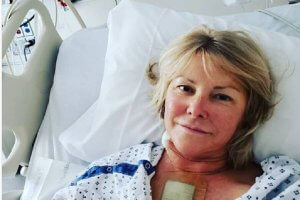Brain Cancer Recovery
- NBC Washington news anchor Wendy Rieger, 65, just recently went through surgery to remove a brain tumor and is currently recovering after the procedure.
- It’s unclear what type of brain cancer Rieger was diagnosed with, but the most common form of the disease is glioblastoma.
- Brain cancer treatment has come a long way in the past few decades, but there's still a lot more work to be done.
Rieger gave an update about her health after going through surgery. According to Rieger, the procedure removed nearly all of the tumor but she will continue to go through treatment in order to ensure all signs of the cancer is gone. “There's just a lot of things that come into focus very sharply when you are facing a crisis like this that make you, again, at the unluckiest time in my life, I have never felt luckier so and I have to remember that,” Rieger told her cohost Doreen Gentzler. “I'm just gonna go back to chasing life.” Rieger said her doctor in Pittsburgh was able to remove "99.99999%" of the cancer. Now, she's getting treatment at Johns Hopkins.
Read More
Progress in Brain Cancer Treatment
Brain cancer treatment has come a long way in the past few decades, but there's still a lot more work to be done. However, there is one exciting development in the field that could be a game-changer for those battling brain cancer or dealing with tumors.
For glioblastoma, the most common form of brain cancer that is extremely aggressive and fast growing, there's an option for patients that may extend survival time Optune. This treatment was approved by the Food and Drug Administration in October 2015, and is available to adults at the age of 22 or older. This tumor-treating therapy comes in the form of a cap due that attaches to a patient's head, where electric currents run through adhesive pads. These currents disrupt the division of cancer cells, which can delay the disease from progressing and thus extend the survival time for some patients.
Most glioblastoma's life expectancy currently stands at two years, but during clinical trials using Optune alongside standard treatment, researchers found that this rate went up. For half of the patients, two more years were added to their median survival, and a third of patients saw their survival rates go up by five more years.
"I just want to emphasize to patients that when I first started doing this in 1999, there were maybe less than 5% of patients with this disease that were alive two years," Dr. Suriya Jeyapalan, a Neuro-oncologist at Tufts Medical Center, told SurvivorNet in a previous interview. "Now we're getting out to maybe a third of patients alive at five years. This is not your father's brain tumor, and I want to sort of give a message of hope to patients. In the future we'll add to these treatments and make it even better."
Learn more about SurvivorNet's rigorous medical review process.


